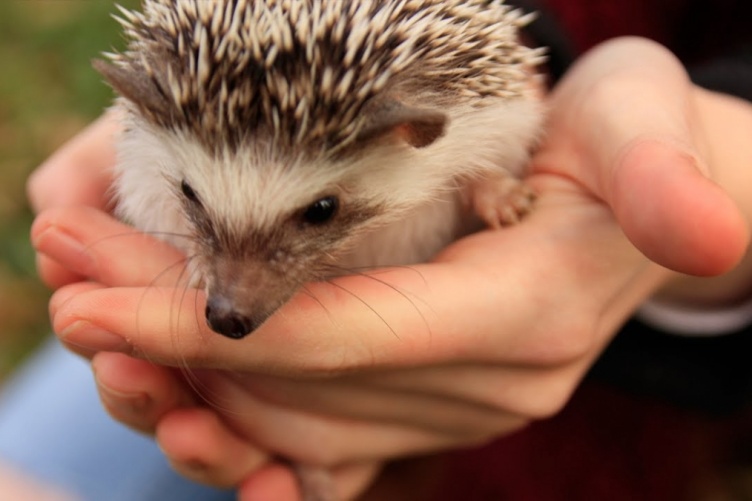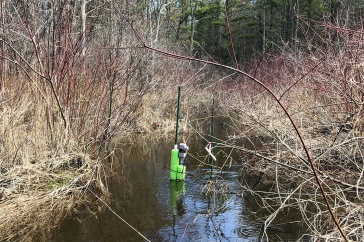
A pathologist with the New Hampshire Veterinary Diagnostic Lab has identified the first case of Skunk Adenovirus-1 in the United States. The rare respiratory disease was found in tissues of a hedgehog submitted for diagnosis and represents only the third confirmed detection of the virus in the world.
“This virus has been identified only twice before this case – the first time was causing liver lesions in a skunk from Canada, and the second time an incidental finding causing a lesion in the trachea of a hedgehog in Japan that died of heart disease. This case is the first report of this virus in the United States and the first time the virus has been associated with a fatal disease in hedgehogs,” said David Needle, senior veterinary pathologist and assistant clinical professor with New Hampshire Veterinary Diagnostic Laboratory at the University of New Hampshire.
 In 2016, tissue samples from one of a group of 35 hedgehogs were submitted by a veterinarian at Plymouth (NH) Animal Hospital to the NH Veterinary Diagnostic Lab. The infected hedgehog was one of eight animals to come down with signs of respiratory disease, and one of three to die seven to 10 days after introduction of 11 new animals into the group. Over the course of the following two to three weeks, seven additional animals came down with respiratory disease and recovered. The hedgehog in question had a single significant lesion that turned out to be bronchopneumonia and tracheitis (inflammation of bronchi and lung tissue, and the trachea, respectively). Needle determined cells in the airways indicated the hedgehog had a viral infection, which they diagnosed as Skunk Adenovirus-1, via collaboration with investigators at UC Davis and Massachusetts General Hospital.
In 2016, tissue samples from one of a group of 35 hedgehogs were submitted by a veterinarian at Plymouth (NH) Animal Hospital to the NH Veterinary Diagnostic Lab. The infected hedgehog was one of eight animals to come down with signs of respiratory disease, and one of three to die seven to 10 days after introduction of 11 new animals into the group. Over the course of the following two to three weeks, seven additional animals came down with respiratory disease and recovered. The hedgehog in question had a single significant lesion that turned out to be bronchopneumonia and tracheitis (inflammation of bronchi and lung tissue, and the trachea, respectively). Needle determined cells in the airways indicated the hedgehog had a viral infection, which they diagnosed as Skunk Adenovirus-1, via collaboration with investigators at UC Davis and Massachusetts General Hospital.
“This is a very rare virus. Finding it at all was a surprise. This type of lesion has never been described in hedgehogs due to any virus,” Needle said.
“This virus is likely to be an emerging pathogen in animals. The two prior cases and our case have all been reported in the last two years. It is also of note that it has infected multiple species, which is generally not the case for adenoviruses. With few exceptions, adenoviruses are host-specific and in healthy individuals cause mild illness,” he said.
In recent years, Hedgehogs have become popular as exotic pets, and are legal in most states, according to the Hedgehog Welfare Society. However, Skunk Adenovirus-1, which was first detected in skunks, cannot be passed from animals to humans, although humans can contract human versions of adenoviruses from other people. According to the World Health Organization, human adenoviruses exist in environments where contamination by human feces or sewage has occurred. They are frequent causes of fevers, upper respiratory tract symptoms, and conjunctivitis, and produce infections that are usually mild.
In the case of the hedgehog tissue samples summited to the NH Veterinary Diagnostic Lab, the animal or animals affected were healthy prior to introduction of new animals, and then came down with respiratory disease.
“It is quite likely that the other ill animals in the group were also infected with this virus. This apparent clinical disease that was fatal in a subset of animals that were all healthy prior to infection is not typical of adenoviruses. There is a possibility that Skunk Adenovirus-1 is recently evolved, and thus has not become well host adapted and therefore causes significant illness. There does exist the potential that Skunk Adenovirus-1 may be able to infect other mammals, including wild or domesticated animals; however, this is theoretical only,” Needle said.
Identification of Skunk Adenovirus-1 highlights the importance of performing a thorough diagnostic workup when a perceived illness affects a group of animals. This applies to domesticated companion animals, exotic animals, agricultural animals, and wild animals.
“Historically disease emergence and re-emergence are ongoing trends, and it is very likely this will continue. Using standard diagnostic pathology and some advanced investigative techniques pathologists at the NH Veterinary Diagnostic Lab and their collaborators at the University of New Hampshire and afield can identify the causes of disease incidents to provide information for treatment and prevention,” Needle said.
This research is presented in the Journal of Veterinary Diagnostic Investigation in the article “Fatal bronchopneumonia caused by skunk adenovirus 1 in an African pygmy hedgehog.” (DOI: 10.1177/104063871881212)
This research is supported by the New Hampshire Agricultural Experiment Station and the State of New Hampshire. The following scientists collaborated with UNH pathologists on this case: Patricia Pesavento and Ken Jackson, UC Davis; viral pathogenesis researchers; Eric Delwart, UC San Francisco; molecular biologist; Martin Selig. Mass General who conducted transmission electron microscopy; Torsten Seuberlich and Stephen Leib, University of Bern, Switzerland, virologist and infectious disease researchers; and Ellyn Tighe, general practice veterinarian, Plymouth Animal Hospital.
New Hampshire Veterinary Diagnostic Lab is co-managed by the New Hampshire Department of Agriculture, Markets & Food and the New Hampshire Agricultural Experiment Station. Since 1970, the lab has provided accessible, timely and accurate diagnostic services for the New Hampshire Department of Agriculture, Markets, & Food, New Hampshire Department of Health and Human Services, New Hampshire Fish and Game Department, state and local law enforcement agencies, veterinarians, farmers, state, regional, and federal agencies, and individuals.
Founded in 1887, the NH Agricultural Experiment Station at the UNH College of Life Sciences and Agriculture is UNH’s original research center and an elemental component of New Hampshire's land-grant university heritage and mission. We steward federal and state funding, including support from the USDA National Institute of Food and Agriculture, to provide unbiased and objective research concerning diverse aspects of sustainable agriculture and foods, aquaculture, forest management, and related wildlife, natural resources and rural community topics. We maintain the Woodman and Kingman agronomy and horticultural research farms, the Macfarlane Research Greenhouses, the Fairchild Dairy Teaching and Research Center, and the Organic Dairy Research Farm. Additional properties also provide forage, forests and woodlands in direct support to research, teaching, and outreach.
The University of New Hampshire is a flagship research university that inspires innovation and transforms lives in our state, nation and world. More than 16,000 students from all 50 states and 71 countries engage with an award-winning faculty in top ranked programs in business, engineering, law, liberal arts and the sciences across more than 200 programs of study. UNH’s research portfolio includes partnerships with NASA, NOAA, NSF and NIH, receiving more than $100 million in competitive external funding every year to further explore and define the frontiers of land, sea and space.
-
Written By:
Lori Tyler Gula, PhD | NH Agricultural Experiment Station | lori.gula@unh.edu | 603-862-1452
















































